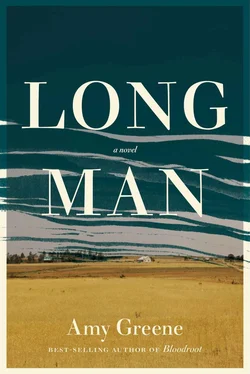As Annie Clyde approached the horse’s grave for a closer look the beech’s limbs creaked. Its leaves twitched and shifted. Gracie let go of Annie Clyde’s hand to feel the silvered scabs of the bark, the scars and bumps. Annie Clyde opened her mouth to say they’d better get on to the house but the words stuck in her throat. She found that she was shaking. Her legs were weak. This long morning had been too much for her. She had to get her breath. The rain wouldn’t harm them if it came. Some hot afternoons they ran out of the house and played in the chilly showers. “Let me see that,” she said, reaching for the tin top again. Gracie resisted for only a second this time before giving it over. Annie Clyde slipped it into her dress pocket like something poisonous. Then she tucked her hands under Gracie’s arms and lifted her onto the beech’s back. As Gracie sat swinging her feet Annie Clyde rested against the end of the trunk. Rusty sniffed at the root ball, mounded with orange mud and green sod like a thatched roof for the hut the bowing roots made. They looked almost alive, a tortured mass of petrified legs, twined arms and hooked fingers, overhung with a finer layer of filaments like the stringy hair of a woman caught out in the rain.
If they were staying, James would have come with his saw when he got home and cut the fallen beech into logs. Last year he’d worked with the reservoir clearance gangs stripping the banks of timber to make navigation channels for boats and to keep the penstock in the dam from getting clogged with brush. The power company said the people could take home the good logs but most had no means of carrying them so they ended up being burned. For weeks the smoke was everywhere, Gracie’s eyes tearing as she played in the yard. James said it would be crazy to turn down any kind of work and she couldn’t dispute him. But it had felt like a betrayal to her.
There were many things she and James had done and said to hurt one another since the power company came to town, but the worst for her had been about a month ago. He had walked up to the porch where she was snapping beans and told her, “The Hankinses’ back pasture’s flooded. That’s right across the hill. Gracie’s liable to take off and be in that lake before you know it.” He was always finding ways to tell her they should leave without saying it outright. Most of the time he was careful with her, perhaps feeling guilty for not standing with his wife against the government, in spite of his own convictions. Not wanting to argue, she’d gone back to her beans. When she didn’t respond he’d shaken his head. “I don’t know,” he’d said. “Sometimes I believe you love this place more than you do me or her either one.” She was stunned by how little he understood her. She loved the farm, but that wasn’t why she fought the power company. From the time she realized she was expecting, she had dreamed of her child roaming the fields in summer. She knew the trees she wanted her child to climb, the flowers she wanted her child to name, the fruits she wanted her child to taste. But her husband had still been talking, and she’d lifted her eyes to meet his as he told her about the job in Michigan. He’d said their nearest neighbor Dale Hankins’s brother was a foreman at a steel mill. He had offered to hire Dale and James both.
Since then she had watched James making plans to settle them up north, too wounded to talk to him about it much. She had let him rent a house in Detroit and take off their furniture without stopping him, not knowing what she wanted herself. She had thought in the beginning she would never give up the farm. She had watched the power company mapping the reservoir area and waited for them to send her one of the field appraisers. When he came in his suit and striped vest, wingtip shoes and a tack gleaming in his tie, she sent him right back to them. The man said he was offering her fair market price but she asked how much more he was going to give her for the appreciation of the land and the trouble it would cause her to move. She told him to figure out how much all of that was worth and come back. The last time he returned, she listened in silence as he explained how things worked. He said his report went before a committee of county agents that knew the value of land in Yuneetah. He hadn’t come up with the price and she ought not to blame him if she didn’t like it. When she suggested he should tell his committee that she wasn’t going anywhere until the water floated her out, he threatened her with condemnation proceedings. After the appraiser left she told James she was going to make them send a marshal with a court order. She was going to appeal her case to the district court and the circuit court of appeals if it came to that. She had seen how fed up her husband was then, how ready to move on, maybe with or without her. James said, “You can’t stand against a flood, Annie Clyde.” He was right, but she’d wanted at least to put the power company out some.
In the end, she had worn down like the rest of the town. There was a dead tiredness that sometimes a person had to obey and lately it had come over her. She went to bed some nights without washing her feet. She knew the land would be taken. Her labors were useless. She’d seen the homes of her neighbors knocked down and burned. She had seen the burial mounds on the riverbank, made by Indians that had lived in caves along the water longer ago than the Cherokees, destroyed by archeologists from Knoxville and the workers they’d hired to do the digging. The largest had been over thirty feet tall with trees growing up its sides, their hoary branches like a covering of cobwebs in winter. They had found among the tools and pottery shards counters used for a game like checkers. She heard the diggers weren’t careful enough and some of the bones were broken, splintered to pieces. Flakes so fine they had returned to dust, particles whirling among the water bugs. Washed away with all those other lost remains.
She guessed part of her hadn’t believed August would ever come, but now it was upon her. She couldn’t fathom what it would be like in Michigan. She pictured a house on a square of balding grass near a curb, the dirty color of winter slush. James going off in the early mornings to a factory where he would work behind a welder’s mask, sucking in and blowing out the suffocating heat of his own breath, leaving her and Gracie alone. She hadn’t even told Gracie they were leaving. She didn’t know how to explain it to a three-year-old. But these last few days she’d been thinking, wondering if she could make it farming on her own. Forty acres was too much, but ten she might be able to manage. Maybe she should have taken the house in Whitehall County the relocation man had offered to show her, less than twelve miles away. She’d felt it didn’t matter how close she lived to her farm. It would still be underwater. James had accused her of being stubborn and selfish but she listened to him more than he thought. He said change was coming whether she wanted it or not. Neither of them had grown up with much, but these past several years were the leanest they’d ever known. He said she ought to be thankful that Gracie might have it easier someday. He said farming killed their parents. But at least the years Mary and Clyde Walker had were spent where they belonged, on their own land. Annie Clyde couldn’t bear to think of Gracie not knowing the closeness to God she had found in this valley. For the first time since Gracie’s birth, Annie Clyde wasn’t sure what was best for her child.
There wasn’t much time to decide one way or another. She and Gracie were supposed to go north with James tomorrow. Two weeks ago he had come driving up in a Model A Ford, the radiator hissing steam. He’d sold their mules to buy it. When he stepped off the running board his eyes were lit up. He grabbed Annie Clyde and kissed her. But his excitement had worn off fast. So far the old stake-bed truck had given him nothing but trouble. He was gone now to see a man in Sevier County about fixing the radiator. Annie Clyde would just as soon he took it to the junkyard. He claimed they needed it to haul their belongings but there wasn’t much left to move. In the front room there were curtains and a rocking chair. In the kitchen there was the pine table her father made before she was born, before his first wife died of rheumatic fever. Like the maple bed upstairs that he’d built for her mother when they got married. Mary Walker had passed away in February of 1933 from a cancer of the womb. She died in that bed, during a winter so cold Annie Clyde saw her mother’s last breath. Nothing else remained but stray wisps of cobweb.
Читать дальше












